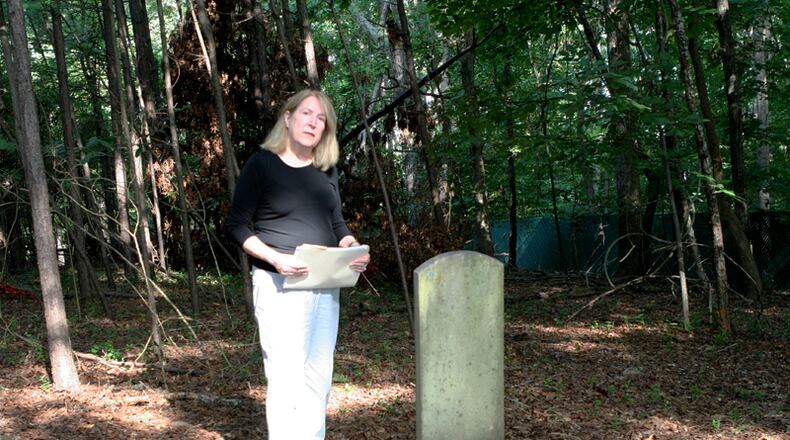Few mysteries of North Fulton County are more poignant than that of the abandoned graveyard of a vanished church. It’s back in the woods, invisible to passersby on busy Medlock Bridge Road in Johns Creek.
The Macedonia African Methodist Church cemetery has at least 53 graves, marked and unmarked, and a few are of former slaves. The Johns Creek Historical Society wants to tell their story.
If only it can find someone who remembers.
“We don’t know too much at this point,” said Joan Compton, historical society president. “Part of the task going forward is to try to find out about the church, to see if we can find any of its members and some documentation about its history.”
Johns Creek earlier this summer accepted responsibility from Fulton County to maintain the cemetery – cutting grass, trimming weeds and removing rubbish at an estimated cost of $3,600 a year.
The land’s ownership is unclear. It’s considered an abandoned cemetery under state law, so local government has the authority to go on the property. Crews last autumn cleared out a homeless camp and cleaned up years of illegal dumping.
“We’ve worked with archeologists, and we’re trying to put together a group now that will give us a sustainable plan to rehabilitate the cemetery – to create walking paths, benches, and possibly interpretive signage about the history of the site and why it’s meaningful,” said Johns Creek City Manager Warren Hutmacher.
Records of old Milton County tell of “two acres sold to the Negroes for a church lot” in November 1905. The oldest gravestones date to the early 20th century, and the newest, from the 1970s. Aerial photos indicate the one-room church was torn down between 1999 and 2002.
“Somebody may have the church records in their basement,” Compton said. “We’ve got to find that person. And if the church disbanded in the 1990s, there certainly would still be people around who remember going there.”
The historical society is working with the Atlanta chapter of the Afro-American Historical & Genealogical Society, “researching the people buried there and the landowners who might have had some of them as slaves,” Compton said.
Each grave may have a story to tell. Compton spoke of April Waters, a male former slave. He had taken the last name of his owner George M. Waters, a wealthy landowner of partial Cherokee descent who had 100 slaves and freed a number of them in his will. Many went to Liberia; most of the emigrants were dead within a year.
April Waters stayed in Georgia and would have been about 16 at the outbreak of the Civil War in 1861. He died in 1910 at age 65 and was buried in the Macedonia cemetery.
“Johns Creek is a new city, only 10 years old, and a lot of its (pre-incorporation) history has disappeared over the years with development,” Compton said. “This cemetery is one physical piece of history that we still have, so it’s important to cherish it.”
About the Author
The Latest
Featured
